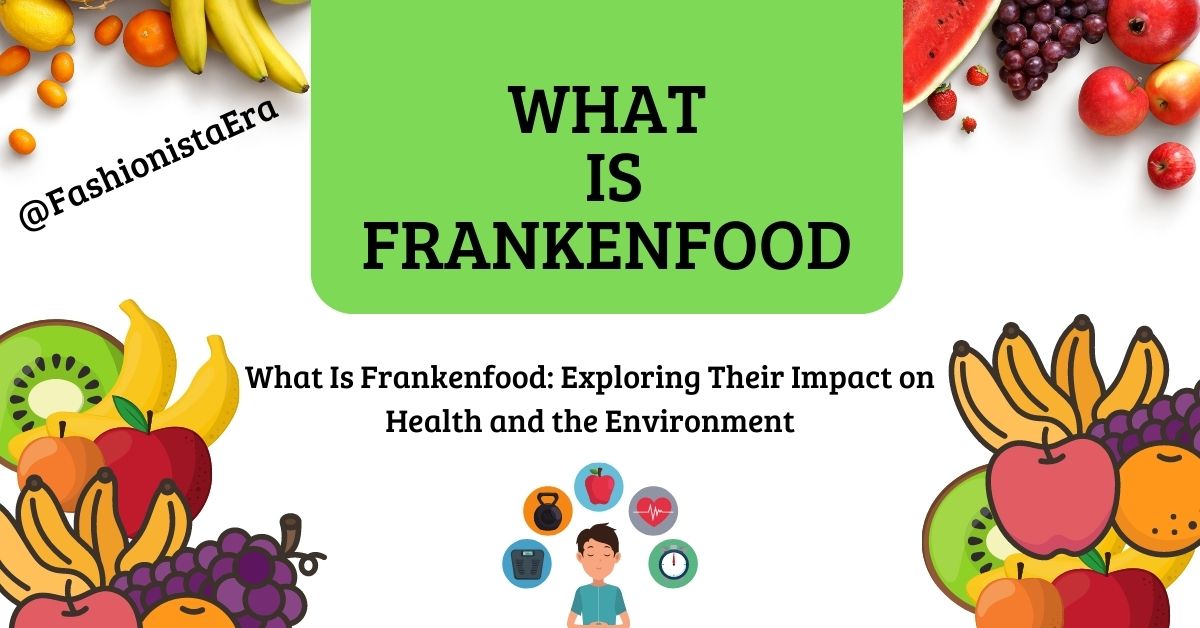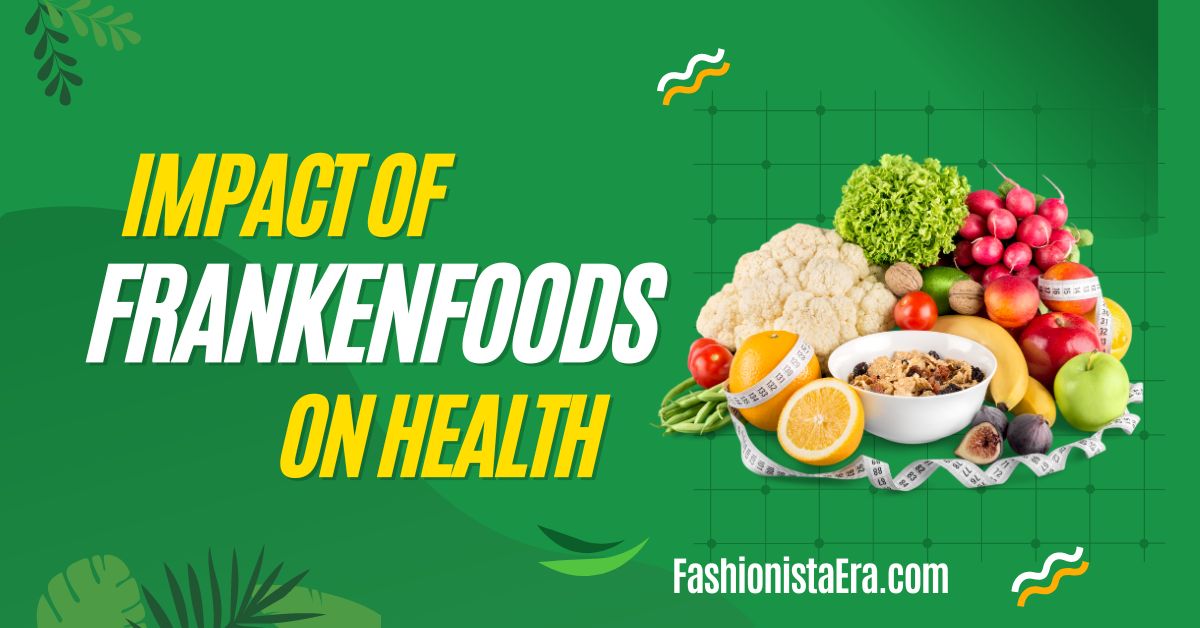Table of Contents
Have you ever heard of Frankenfoods? They may sound like something out of a horror movie, but they are actually genetically modified foods that have become increasingly common in our diets. While some argue that these “Frankenfoods” offer benefits such as increased crop yields and resistance to pests and disease, others are concerned about their potential impact on our health and the environment.
In this blog post, we will explore What is Frankenfood, the different types of genetically modified organisms (GMOs), their pros and cons, their impact on health and the environment, and whether or not they are good for us. So grab a snack (hopefully not a Frankenfood!) and let’s dive in!
What Is Frankenfood?
Frankenfoods, also known as genetically modified foods (GMOs), are created by altering the DNA of plants or animals in a laboratory. This process involves taking genes from one organism and inserting them into another to create an entirely new strain. These new strains can have traits that they wouldn’t normally possess, such as resistance to pests or herbicides.
There are several different types of Frankenfoods, including crops like corn, soybeans, and cotton that have been engineered to resist insects and tolerate herbicides. There are also GMO animals such as “frankenfish” salmon that grow faster than their wild counterparts due to genetic modifications.
The creation of these Frankenfoods has sparked much debate among scientists and consumers alike. Some argue that GMOs offer benefits such as increased crop yields and decreased pesticide use, while others voice concerns about their potential impact on human health and the environment.
Despite this controversy surrounding Frankenfoods, they continue to be widely used in our food supply chain. In fact, it is estimated that up to 80% of processed foods sold in the United States contain ingredients derived from genetically modified crops.
Understanding what Frankenfood is all about is important for consumers who want to make informed decisions about their food choices.

The Different Types of Frankenfoods
Frankenfoods, or genetically modified foods (GMOs), come in many different forms. One of the most well-known GMO crops is corn, which has been engineered to be resistant to certain herbicides and pests.
Another type of Frankenfood is soybeans, which have also been genetically modified for resistance to herbicides and pests. These crops are commonly used in processed foods such as bread, cereal, and other packaged goods.
In addition to crops like corn and soybeans, there are genetically modified animals that fall under the category of Frankenfoods. Perhaps one of the most controversial examples is the “franken moose,” a proposed hybrid between franken moose and domestic cattle that was developed by researchers in Sweden.
Beyond food products themselves, there are also various types of Frankenfood products on the market. For example, some companies use GMO ingredients in skincare products such as lotions and cleansers.
Despite their prevalence in modern agriculture and food production industries today, it’s important to consider both the potential benefits and risks associated with consuming these genetically altered organisms.
Pros and Cons of Frankenfoods
Frankenfoods, also known as genetically modified organisms (GMOs), have been a topic of debate for decades. While some argue that they are beneficial and can help solve world hunger, others believe they pose significant risks to both human health and the environment. Here are some pros and cons of Frankenfoods.
Pros:
One advantage of frankenfood GMOs is that they can be engineered to withstand harsh environmental conditions such as drought or pests. This could provide a solution to food insecurity in developing countries where crops often fail due to these factors.
Another benefit is that frankenfood GMOs can be used to produce more nutritious foods by adding vitamins or reducing harmful substances like saturated fats.
Cons:
On the other hand, critics argue that there are numerous potential risks associated with consuming Frankenfoods. For example, there’s still much unknown about how these foods may impact our long-term health.
Some studies suggest that consuming frankenfood GMOs may result in allergic reactions or lead to antibiotic resistance over time. Additionally, genetically modified plants can cross-pollinate with non-GMO crops which poses a risk for biodiversity loss.
While genetic engineering has the potential to address many issues related to food production and nutrition globally, it’s important not to ignore its possible drawbacks when considering its implementation on a large scale.
What is the impact of Frankenfoods on health?

The impact of Frankenfoods on health has been a topic of debate for years. Some argue that these genetically modified foods are safe to consume, while others believe they pose significant risks.
One potential risk is the possibility of developing allergies or other adverse reactions to the altered genes in these foods. For example, some studies have shown that consuming GM soy can lead to increased allergic reactions in individuals who are already sensitive to soy.
Another concern is the potential impact on gut health. Studies have found that certain genetic modifications can alter the composition of beneficial bacteria in our digestive systems, which could have long-term consequences for overall health and immunity.
Additionally, there are concerns about the widespread use of pesticides and herbicides associated with GM crops. These chemicals can be harmful not only to human health but also to wildlife and ecosystems.
More research is needed before we fully understand the true impact of Frankenfoods on human health. Until then, it’s up to each individual consumer to decide whether or not they feel comfortable consuming genetically modified products.
Are Frankenfoods good for you?
Frankenfoods, also known as genetically modified foods or GMOs, have been a topic of debate when it comes to their impact on human health. Some argue that they are beneficial because they can produce crops resistant to pests and diseases, while others claim that consuming them can lead to negative health outcomes.
One concern is the potential for allergenic reactions in those who consume Frankenfoods. When genes from one organism are inserted into another, there is a risk that new proteins could be created which may cause allergic reactions. Additionally, some studies have suggested that consuming GMOs can result in antibiotic resistance due to the use of antibiotic-resistant markers during genetic modification.
On the other hand, supporters of Frankenfoods argue that they can be nutritionally beneficial and help address global food shortages. For example, Golden Rice has been developed with additional nutrients such as beta-carotene to address vitamin A deficiencies in developing countries.
Whether or not Frankenfoods are good for you largely depends on individual perspectives and priorities. While some view them as a solution to global hunger and malnutrition problems, others remain skeptical about their long-term effects on human health.
Frankenfood Recipes
Frankenfood has been a controversial topic for years. However, it is important to note that not all genetically modified foods are bad. In fact, some can even be used in delicious and creative recipes! Frankenfood recipes often include ingredients that have been genetically modified to enhance their flavor or nutritional value.
One example of a popular Frankenfood recipe is the 94011 Banana smoothie bowl. This 94011 banana variety was created by scientists to contain more vitamin A than traditional bananas. The smoothie bowl combines this nutritious fruit with other healthy ingredients like almond milk and chia seeds, making it a great breakfast option.
Another Frankenfood recipe is the Franken Moose burger made from lab-grown meat. While some may find the concept strange, lab-grown meat has potential benefits such as reducing greenhouse gas emissions associated with traditional animal agriculture.
While there are concerns about genetically modified foods, exploring new and innovative Frankenstein-inspired recipes can offer unique culinary experiences while also considering the sustainability of our food systems.
Impact of Frankenfoods on the Environment
The impact of Frankenfoods on the environment is a topic that has been widely debated, and for good reason. Genetically modified organisms (GMOs) can have significant effects on our planet’s ecosystems.
One major concern with Frankenfoods is that they may harm non-target species. For example, if genetically engineered crops produce their own pesticides, this could kill off beneficial insects like bees and butterflies as well as other wildlife that feed on these insects.
Another potential environmental issue with GMOs is that they can lead to the development of resistance in pests and weeds. This means that more chemicals will be needed to control them which will ultimately contribute to soil degradation and water pollution.
Moreover, Frankenfoods are often grown using intensive farming methods such as monocultures which involve planting only one crop type over large areas of land. This leads to biodiversity loss since it reduces habitat diversity for native plants and animals leading ultimately to an imbalanced ecosystem.
GM crops also pose a risk of contaminating wild relatives or conventional crops through cross-pollination or gene flow via pollen transfer. Once released into the natural environment it’s almost impossible to reverse any unintended consequences resulting from genetic modification.
While there may be benefits associated with GM foods when it comes down solely towards yields per acre per year; however considering all factors including long-term impacts -it becomes clear why many people remain skeptical about those products’ safety both for human consumption & protection against environmental damage ramifications.
Alternatives to Frankenfood
If you’re looking for alternatives to Frankenfood, there are several options available. One alternative is to purchase organic fruits and vegetables that are grown without the use of genetically modified organisms (GMOs). Choosing organic produce also supports sustainable farming practices.
Another option is to look for products that are labeled as non-GMO or GMO-free. These products have been verified by third-party organizations and do not contain any genetically modified ingredients.
You can also opt for locally sourced foods from small farms. Small farmers tend to use traditional farming methods that do not involve genetic modification, making their produce a great choice if you want an alternative to Frankenfood.
Consider growing your own food in a home garden. This allows you complete control over what goes into your food and ensures that it’s free from harmful chemicals and GMOs.
By choosing these alternatives, you can support healthier and more sustainable food production while avoiding the potential health risks associated with Frankenfood.
Conclusion
What is Frankenfood? Frankenfood or genetically modified food has its own benefits and drawbacks. They have become a common topic of discussion among health and environmental experts. While these foods are designed to be more resistant to pests and diseases, there is still much debate about their impact on human health.
Proponents argue that genetically modified crops can help feed the world’s growing population by increasing yields and reducing losses due to disease and pests. However, opponents maintain that these crops could cause unforeseen consequences for both human health and the environment in the long term.
The bottom line is this: while some people believe Frankenfoods may offer benefits, it’s important to consider all aspects before taking sides. As consumers, we should remain informed about what we’re eating so that we can make educated decisions about our food choices.
What are some common examples of Frankenfoods I should avoid?
Some common examples of Frankenfoods you should avoid include processed meats, hydrogenated oils and trans fats, high-fructose corn syrup, artificial sweeteners, and foods that contain too many additives and preservatives. It’s best to stick with natural and minimally-processed whole foods whenever possible.
